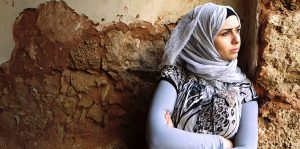
While living as refugees in Beirut, a group of 35 oppressed Syrian women finds strength, a sense of purpose, and some freedom during an Open Art Foundation theater workshop on the intensely relatable Greek tragedy, Antigone. As incomprehensible as this is, male oppression is still a disgustingly widespread practice in so many misogynistic cultures. Intelligent women with so much potential are groomed to bite their tongues and abide by men’s wishes. We Are Not Princesses movingly captures how these women relate to Antigone’s plight and strive to stand up for themselves.
Here’s what you need to know about Antigone for the purpose of this documentary. Antigone’s two brothers kill each other in battle. King Creon refuses to mourn and bury the instigator, Polynices. Antigone breaks the king’s law and properly buries her brother, for not doing so would be blasphemy. King Creon sentences her to death. She sadly takes her own life. It is fascinating to see how these women interpret Antigone. Some of them applaud and admire her rebellious efforts, while others can sympathize with King Creon and defend his attempts to maintain order.
The Syrian ladies are shocked by how strong and stubborn Antigone was. One of the greatest lessons they learn is that “a woman doesn’t have to accept a man telling her ‘no’ or ordering her around. She doesn’t have to submit to men…” In their culture, women are not given the option. They are beholden to the men in their lives because there is no other choice.
“Antigone breaks the king’s law and properly buries her brother…King Creon sentences her to death.”
They each explain how women must accept a man’s decisions in Syria. “That’s it, this is your husband, the one spending money on you.” They are forced to be “dependent on men by necessity.” Women have no choice but to rely on their fathers, brothers, and husbands because men are always in control. Unlike in Lebanon, women are not offered the opportunity to work, pursue their interests, or establish their own identity outside of being a mother, wife, and daughter. Men dictate everything – whether or not they can smoke, wear makeup or leave the house.
Imagine how suffocating that is. These women’s lives are so restricted that they find a sense of self and get a taste of freedom after fleeing Syria and living in a Lebanese refugee camp. As one of them observes, “In this exile, we’re stronger because we’ve lost so much. We have to defend what is left.”
The documentary’s narrative structure further proves the point. Some women are too afraid to be seen on camera, so their stories are beautifully depicted with illustrations. We see how they heartbreakingly lost loved ones to tragic shootings and illness. They relate to Antigone’s plight because they understand how it feels not to be able to bury someone properly. These women have sons and brothers who were brutally murdered and left in the shelled streets. They are still haunted by the fact that they could not put their loved ones to rest. Others mourn the life experiences they’ve been robbed of.
A couple of the refugees were married at the ages of 14 and 15. One young woman envies Antigone’s love story, saying, “my family wronged me…deprived me of love. They kept me from having a beautiful love story in my life.” These young women do not see their lives changing, for their life’s purpose has been charted. Their individual roles are to be doting mothers and obedient wives. They can’t even be disillusioned by the bit of hope Antigone’s story has to offer. It is heartbreaking. Even though we don’t see them speaking, we can hear the devastation, frustration, and remorse in their voices.
“…this workshop is a cathartic and empowering experience for many of the Syrian women.”
For the most part, this workshop is a cathartic and empowering experience for many of the Syrian women. Antigone has given them a voice and outlet through which they can finally express themselves. They have candid and illuminating conversations while sharing their interpretations of the play. Most of the women want to be like Antigone, but in reality, they all have men like Creon preventing them from being like her. However, they still take pride in the progress they have made for themselves in the refugee camp.
“We are telling Antigone’s story, but we are telling our own story as well.” Having found a sense of purpose and strength, they affirm, “We are still writing our stories.” They also note the significant differences between Antigone and themselves. Would Antigone have done the same thing if she had children? Would she be afraid for them? If she was not a princess, would she have the same strength and confidence?
In the end, they make this heartbreaking observation: “We are not princesses. No one knows us nor would say anything if we died.” This documentary can change that because now we do know these women and understand the challenges they face. Directors Bridgette Auger, Itab Azzam, and editor Sara Maamouri have done a beautiful job of capturing these powerful stories and showcasing the Open Art Foundation’s important work.
We Are Not Princesses (2018) Directed by Bridgette Auger, Itab Azzam.
9 out of 10 stars
